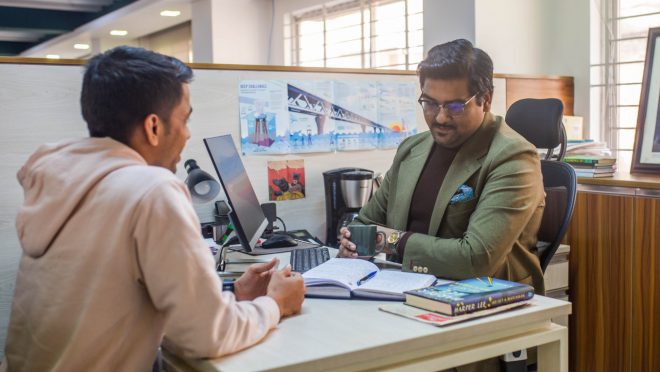Why university professors want you to talk to them
Even if you have excelled in the past without reaching out to teachers, you will find that this approach may not be as effective in university
Why university professors want you to talk to them
Even if you have excelled in the past without reaching out to teachers, you will find that this approach may not be as effective in university

One of the most underutilised opportunities for university freshmen is visiting a professor during office hours. This one-on-one attention has the potential to provide valuable insights, leading to better grades and a more enriched education in the long run.
It is important to understand the value of communicating with your professors. Not only will it benefit your academic performance, but it can also enrich your educational experience.
Unlike high school and college, where you could show up, pay attention and get good marks, university demands more independent work and a higher level of engagement from students. Even if you have excelled in the past without reaching out to teachers, you will find that this approach may not be as effective in university.
Moreover, university courses are more complex and professors expect students to take control of their own learning. That’s why it’s essential to ask for help when you need it and even when you don’t think you do.
For these reasons and beyond, don’t hesitate to take advantage of the opportunity to connect with your professors. They’re there to help and want to see you succeed.
Do teachers really want to hear from their students?
It is common for new university students to feel hesitant about asking for help from their professors. However, the truth is that most professors welcome and encourage student communication.
“I want my students to come to me for any kind of problems they face, especially when it comes to academic decisions. Counselling from my teachers had major significance in my career. So I want my students to have that opportunity too,” says Nadim Chowdhury, assistant professor at Bangladesh University of Engineering and Technology (BUET).
Instructors deeply appreciate when students use office hours to clarify concepts, ask for additional resources, or gain a better understanding of the material.
“I personally like to hear from the students. And I found my other young colleagues sharing the same mentality,” says Tasnia Mizan Chowdhury, assistant professor at Shahjalal University of Science and Technology (SUST), Sylhet.
According to a study conducted by Christopher M Estepp and T Grady Roberts of Sul Ross State University and University of Florida respectively, there is a positive correlation between the frequency of professor-student interactions and academic performance of students. Positive encounters with professors can boost students’ confidence and challenge them to grow intellectually, potentially leading to higher grades.
Even if a professor has a large class size, office hours provide a chance for individual engagement with each student. Even if it’s only for five minutes, a professor can give their students full attention and offer advice on conquering the roadblocks impeding their understanding.
“Additionally, a professor uses student queries as a basis for assessing the effectiveness of their lectures or classroom experience. In some cases, an instructor may even tweak future lectures to address a question raised by a student,” comments Nadim.
Why should you try to speak to your professors?
To begin with, visiting a professor during office hours can be an opportunity to ask questions that you may have been too embarrassed or shy to ask in class. Raising your hand and admitting that you don’t understand something in front of your peers can be intimidating, so a one-on-one conversation with your professor can be an easier way to clarify a concept and ensure you understand it before moving on.
“I think, in a class, there are students of different categories and they differ in their capacity to understand the lecture. So if someone is in need of further support from the teacher, they should definitely talk to the teacher,” Tasnia explains based on her experience at SUST.
For students interested in research, speaking to professors can open doors to research assistant positions or collaborative projects. Professors can offer valuable academic advice, such as course selection, major or minor choices, and strategies for academic success. They can help students plan their academic journey and set realistic goals.
– Nadim Chowdhury, assistant professor, BUET
Additionally, and perhaps more importantly, establishing a rapport with professors can lead to positive relationships that extend beyond the classroom. “When students need letters of recommendation for scholarships or job opportunities, having a relationship with professors who can write strong, personalised letters is crucial,” according to Nadim.
Professors can serve as mentors and offer career advice. Moreover, they often have connections in their fields of expertise and can introduce students to other professionals, researchers or organisations in the field.
“For students interested in research, speaking to professors can open doors to research assistant positions or collaborative projects. Professors can offer valuable academic advice, such as course selection, major or minor choices, and strategies for academic success. They can help students plan their academic journey and set realistic goals,” Nadim Chowdhury adds.

The meetings can also prevent you from getting frustrated and giving up. If you don’t understand the material, you are likely to become less motivated. If your instructor can clarify it though, it can get you back on track.
Al Amin Munna, a student at Dhaka University, said, “I had to take a two-year gap for some family issues. I thought of giving up my studies and I already started a small business, but when I talked to one of my teachers, he advised and helped me get readmitted. Now I am in my final year, hoping to graduate this year.”
Furthermore, meeting your professors can help you get to know them on a personal level. Knowing something about their point of view and background may also help you feel more engaged in coursework. It may even encourage you to stay in the university.
A 2015 College Teaching Study conducted by Ashley Grantham of Duke University and Diane D Chapman of North Carolina State University revealed that students who met with professors increased their confidence in the subject matter and felt that their professors respected and cared about them.
University professors assume students will stay on top of coursework by themselves and reach out when they have problems. That means it’s up to you to have the confidence and maturity to know when you need help and to seek it.
Here are a few tips to keep in mind while visiting your professor:
- Prepare beforehand by reviewing your notes, readings and lectures, and writing down specific questions. This will show your professor that you have put the effort into understanding the material and it will also make you feel more confident.
- Introduce yourself, especially if it is a large class or early in the semester. Do not assume your instructor has learned everyone’s names.
- Respect your professor’s time by not showing up at the last minute. Arrive early enough so that the instructor does not need to stay back late.
- Maintain a positive attitude and show enthusiasm for the course. Believe in your ability to learn, even if you are struggling.
- Be professional and act like an adult. Avoid wearing sunglasses or headphones, and do not check your phone for messages during your visit. Accept any criticism professionally, without taking it personally or complaining.
- Communicate clearly and assertively, but do not be confrontational. Explain the concepts you are having difficulty with and ask for suggestions to improve your understanding.
If you pass up a professor’s office hours, you will be passing up a tool that could potentially be an academic game-changer. Step into your professor’s office and you will take control of your university experience, stimulate intellectual growth, network and be introduced to future possibilities you never thought about before.


